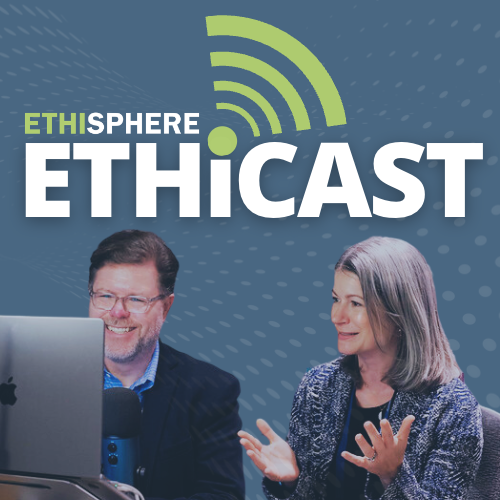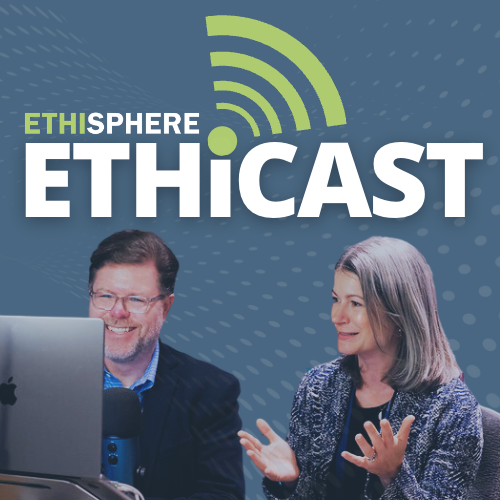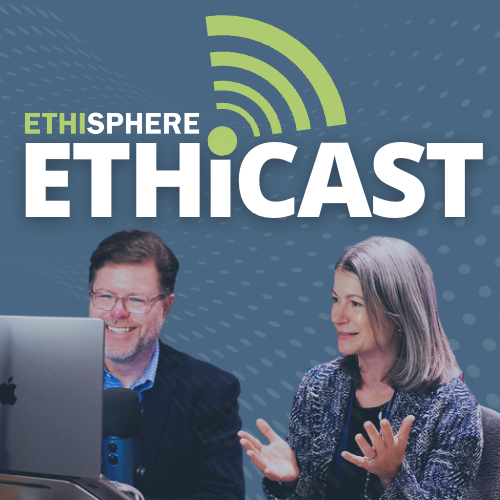Episode Transcript
[00:00:00] Speaker A: Foreign.
[00:00:13] Speaker B: Hi everyone. You've got questions and we've got answers. Welcome to a very special live edition of BELLA asks a subset of the Ethicast. Now, the Business Ethics Leadership alliance, or bella, is a global ethics and compliance community that provides exclusive access to helpful data, fair benchmarking events and other resources to advance your ethics and compliance program.
One of the many resources of BELLA is its concierge service in which members can submit any question at all regarding ethics and compliance and our internal experts will provide an answer, plus helpful resources with more information. It's really, really cool. Now, while we invite everyone watching and listening to join bella, we also know that there is no competition in compliance.
[00:00:55] Speaker A: So.
[00:00:55] Speaker B: So that's why we're using this program to thematically respond to high level questions from the BELLA community for the benefit of ENC teams everywhere. And joining us once again to answer those questions is Bella chair Erica Salmon Byrne. Erica, as always, it is terrific to see you. Thank you so much for joining us today.
[00:01:11] Speaker A: Oh, Bill, it is terrific to be here with you. As you know and as longtime listeners of the Bella Asks genre of at the Cast know, I love coming back to answer these questions because it means that our community has them.
[00:01:23] Speaker B: Well, we have a terrific question for you today, and this is a board reporting question and it reads, how can I improve or expand my quarterly updates to the audit committee?
[00:01:33] Speaker A: Yep. And I love the fact that we're doing this one as a live stream, Bill, for a couple of reasons. One, I know that we have a lot of people who engage in the LinkedIn live stream at the cast experience with us and they may very well this time of year in particular be thinking about this question. So I think it's a great question to be sharing at this particular sort of time in the traditional corporate calendar because you're probably prepping for fall board reporting or maybe you're thinking about what 2026 is going to look like. Maybe you have a new committee member. Maybe you even have a new committee chair. Right. Maybe there's been some turnover in your leadership team. There are all kinds of reasons where, you know. So this time of year might be a time where you start to think about what could I start to do differently. So a couple of thoughts for our audience on this one. First, if you haven't already had a chance to take it in, please go listen to the wonderful webinar that our colleagues did along with a guest Bella member from Booz Allen Hamilton on board reporting because Jody and Leslie and yourself had this wonderful conversation about how to Think about that relationship because really at the heart of it, Bill, the audit committee or whatever your committee is, right, it's often the audit committee doesn't have to be the audit committee, but it often is the audit committee. The point of that committee is for them to be engaging in appropriate oversight of the risk mitigation functions that you and activities that you are engaged in for far, far, far, far, far too long.
The only way they did that was by looking at hotline reporting.
And that is simply insufficient, quite frankly, for a couple of reasons. One, your hotline reports are only going to be a fraction of what is happening across your business.
It is a fraction of what your team is engaged in.
And therefore you are giving the board just this extraordinarily narrow slice into the activities of the program and the ways in which that program is attempting to mitigate risk. So the best companies that are doing this work right now, we see really thinking strategically about, okay, I have an annual cycle that my program goes through. It is working on different things at different times.
If I were overseeing this program, what were the, what are the things that I would want to know about it on an ongoing basis? Would I want to know speed to completion of training, for example? Would I want to know how communications are going? Would I, would I want to know whether or not the ethics and compliance team is at the table for M and A when M and A happens? Would I want to know how you are thinking about emerging regulatory risks? Would I want to know how you're utilizing AI? The answer to it to those questions, by the way, to every last one of them, is yes. And so think about the ways in which you can make sure that you are delivering information to your oversight committee in such a way that they're able to effectively discharge their oversight obligations for the program and they're able to make sure that they are asking you smart questions and you are then able to get the resources that you need. Because that's the other side of this puzzle, right? If you only give them hotline stats and speed to completion of closure and substantiation rates and those sorts of things, how do they know that you need more training resources, right? How do they know that you need budget to do a program assessment? You're not giving them a holistic picture of the program such that they can actually effectively help you advocate for the resources you need to do the work you have to do.
I can see a follow up question, Bill, so I'm going to pause.
[00:05:18] Speaker B: Well, no, I, you know, I guess, I guess this is more of a tonal question. But in that webinar that you referenced, one of the themes that came up that was so striking to me was how, you know, board reporting. It's almost like when you and I talk about how we wish there was a better way to talk about speak up. Rather than calling it whistleblowing, it was a bit more like, you know, the board reporting nomenclature suggests a one way transmission of information, you know, from the ENC function to the board and essentially giving it a view to the program through a keyhole rather than, rather than a more full blown conversation that opens the door to the program so you can see the entirety of what's going on. So to get your thoughts on the notion of all these best practices you spoke about and all those limitations you warned of have, how, you know, how do you see them as being part of this effort of creating a larger conversation and thus a stronger, you know, a larger, larger conversation with the board and thus a more robust relationship with the board strategically.
[00:06:11] Speaker A: Yep. Yeah, I think that's a real, it's a really interesting analogy, Bill. And now of course, all I can picture is like, you know, a board member down, like kneeling next to a door with their eyes through a keel. Very, very, very visually engaging.
Yeah, so, I mean, I think, I think it's a really good point.
Look here, here's, here's the way that I would think about. I'm going to give you another analogy.
If, think of the, think of the relationship that you have with your oversight body, your oversight committee, in the same context that your other control functions, think about their relationships.
So think about the, you know, internal audit. What is your, what is your internal audit team's relationship like with their audit with the audit committee?
And try to draw some inspiration from that. That's a dialogue, right? Controls, issues, etc. Etc.
It's a similar way to kind of think about the relationship between the ethics and compliance program and the oversight committee.
And one of the key places to dig into that a little bit is going to be in your relationship with your, with your chair. So we have a lot of data in the sphere about how the person responsible for running the ethics and compliance program, what their relationship is like with their audit committee chair. And I'm very happy to report that a majority of companies in the data set say that the person responsible for the program is meeting on a regular basis with the audit chair or oversight committee chair by whatever, whatever name it's called.
And that's a really good thing for a couple of reasons. One you have, you've built that relationship so when there is an emergency, you can pick up the phone and call that person. You know, when there is something that is going on, the you're not introducing yourself to your committee chair for the first time when you call to say, hey, we got a complaint that came in that our CEO might be involved with a member of the executive team. Right.
Which, that's a hat tip. Back to Bill's in my last LinkedIn Live conversation, which was about the Nestle CEO exiting Nestle because of a hotline complaint. Can you imagine being the person who had to like first make that phone call to the board chair and, and the, and the committee chair. Like you want that relationship well established before you have to make that, that phone call or draft that email. So think about, you know, how do I establish a relationship with my committee chair? How do I make sure that I'm getting them the opportunity to weigh in on the pre read. Can I sit down with them when I'm in my annual planning process, my annual planning cycle and have a conversation with them about what they want to see from my reporting over the course of the next couple of years? That's particularly important if you are dealing with a new committee chair. Right. You want the opportunity to have that conversation, to understand. Okay, let me brief you on what these reports used to look like and let's talk about how you might want to think about doing them differently. The other thing is many of these committee members are also on boards of other companies. So ask your committee chair.
Is another company that you sit on the board of. Are they doing something that we're not doing? Should we be thinking about doing something better? Right. There's an opportunity for that kind of cross pollination and learning so that your conversation with the committee is far less of a passive report out and much more of a dialogue.
[00:09:47] Speaker B: Yeah, yeah. Well, Erica, another wonderful question. Another wonderful answer rather to another wonderful question. So thank you so very much for joining us today and offering your insights on this topic for the benefit of the ENC community everywhere. I know the folks watching really, really appreciate it. So once again, thank you for being so generous with your expertise.
[00:10:05] Speaker A: Oh absolutely, Bill. 100% my pleasure. So just a couple of quick resources to point our listeners to.
One, of course, is that webcast that I mentioned at the beginning of my answer. That is on the Bella member hub. If you didn't register for it originally and you want to take a look at the replay. We also do board panels every year at the Global Ethics Summit. We have, we hear from directors about what they are wanting to hear from compliance teams and we hear from compliance teams about what their relationship is like with their directors. And we have a recording from a couple years ago at the Global Ethics Summit when you know, sort of my.
What's my. My squ. Is it squad goals? Is that the phrase like if you know when you're thinking of who you want to be in. In 20 years?
[00:10:49] Speaker B: Yeah.
[00:10:50] Speaker A: The audit. The, the woman who was the audit chair at the time at WSP described her role as a board member as being inspirationally irritating. And I just, I thought that was such.
So well phrased. And that jes. Recording still lives on the hub. If you want to go ahead and take a look at that. So there's lots of places where if you're wondering kind of how to start this dialogue with your committee chair, you're wondering what it could potentially look like.
You know, those are, those are some really, really great places to start. And then of course, Bill, I have to say, if you haven't already subscribed to Bella asks, I hope you that you have have gotten a sense of the way Bill and I run these short, quick little snippets every Friday where you can, can hear what the Bella community is asking us about and, and hear what our thoughts are on it. So to all of you out there listening in to Bill and I keep the questions coming, okay. Because that means I get to come.
[00:11:44] Speaker B: Back and answer them most definitely. And to learn more about Bella, please visit ethisphere.com bella that's B E L A to request guest access to the member resource hub and to speak with the Bella engagement director. And if you have a question that you would like answered on, contact the Bella Concierge service and we'll get to work on it for you. Well, this has been another Bella Asks episode of the Ethicast. So thank you to everyone out there for watching us. We hope you've enjoyed the show. If you haven't already, please like and subscribe, as Erica mentioned to us on YouTube, Apple Podcasts and Spotify. And also please be sure to tell a colleague or two about us as well. It really helps expand the reach of the program. That's all for now, but until next time, remember, strong ethics is good business. We'll see you soon.


